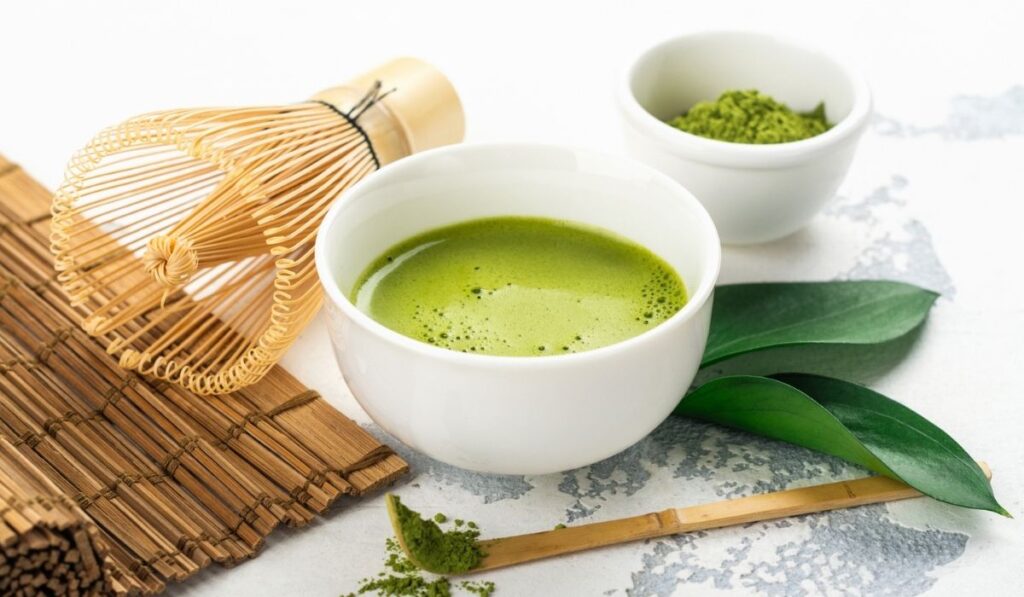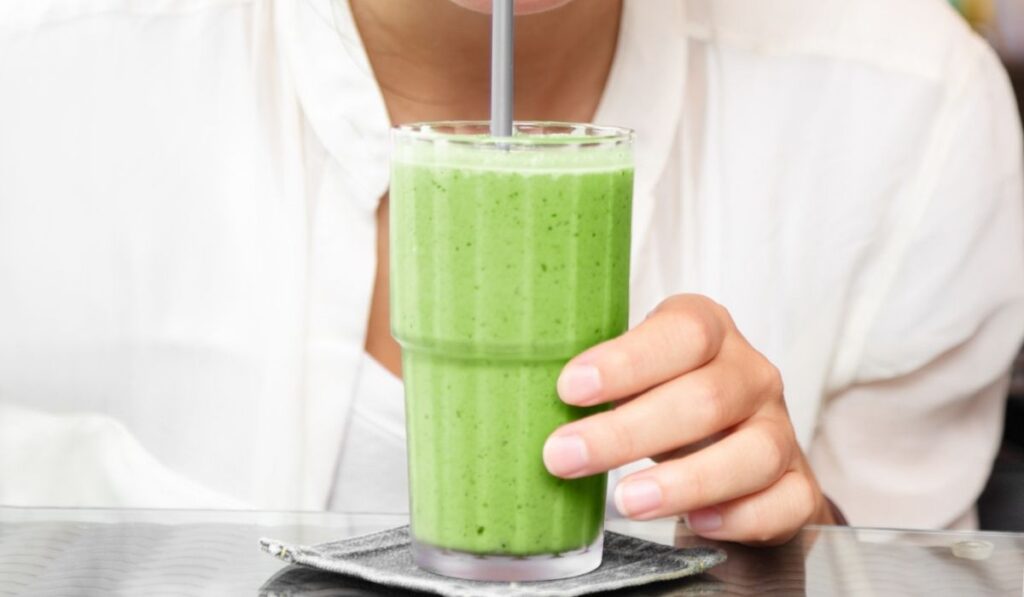If you’re just starting to drink matcha green tea, some questions might be popping into your head about this mysterious green drink that tastes so good. One of those questions might be whether it’s good for your teeth (especially if you’re trying to avoid some of the negative effects other popular drinks, like coffee, have on your oral health). There’s good news on that front: matcha is a friend of the teeth!
Matcha green tea contains a handful of powerful antioxidants that can help treat tooth sensitivity, combat the bacteria associated with decay, and fight bad breath. Because it’s taken in liquid form, matcha even acts like a mouthwash, clearing out bacteria from the nooks and crannies of your mouth.
Now that you know matcha is beneficial to your oral health, let’s take a deeper look at why exactly that is. Understanding the benefits of matcha will help you to to fully appreciate and take advantage of your new favorite beverage.
What Is Matcha?

Matcha Powder (on Amazon) is produced by grinding specially grown and processed green tea leaves into a fine powder. This preparation method differs from that of regular tea, which usually requires that you insert tea leaves directly into water. What Matcha requires you to do is combine the powder with hot water.
Drinking Matcha means that you’ll enjoy the full benefits associated with drinking green tea because you’re drinking the entirety of the leaves. So that means you’ll get the benefits of their nutrients, effective antioxidants, and other health-enhancing benefits.
Matcha leaves are also specially grown in the shade for several weeks. During shaded growth, the plant produces more amino acids and caffeine than it normally would.
How Does Matcha Affect Your Teeth?
Matcha green tea’s antioxidants are the major component that makes it stand out among the many teas out there. Of course, you can find antioxidants in most teas, but in matcha, you would find about three times as many antioxidants as in regular tea.
Antioxidants promote systems within the body that are responsible for producing the protective layers around individual molecules, allowing them to have more of a defense against bacteria and other processes that could harm them.
This is a pretty big oversimplification, but it’s enough for you to understand that antioxidants can disrupt bacterial growth in a way that reduces the likelihood of you growing bacteria in your mouth that can lead to more complications down the line.
Matcha green tea has also been shown to boost the power of anti-fungal medications used to treat oral thrush. This infection usually disguises itself as a white coating on your tongue. Although it is a rampant and common condition that doesn’t give rise to major problems, if you have a decreased immune system or a compromised one, you may encounter challenges when trying to regulate the symptoms.
Dentists even recommend that you take a cup or glass of matcha tea after a meal because it can help combat the growth of the bacteria that tend to cause plaque. Matcha is recommended to be used as a delicious liquid floss (after a meal) or as a mouthwash that would help eradicate the bacteria that causes bad breath.
Can Drinking Matcha Fight Gum Disease?

Several studies have shown that matcha helps the body fight against gingivitis. In particular, ten different bacterial strains (at least) that are famous for inflicting gingivitis and tooth decay can be stopped by the antioxidants in matcha.
Since the antioxidants are contained in a liquid, they can perform their duties by being used as a mouthwash to ensure that all the bacteria hiding in your mouth can be located and flushed out.
Gingivitis and bad breath are not the only things that oral bacteria cause. They are also responsible for cavities.
It’s normal for everyone to have some bacteria in their mouth as they help in the breaking down of food particles. However, as soon as there is an imbalance between the various types of bacteria existing in your mouth, you are most likely to have bad breath.
Matcha contains a couple of elements that can reinstate that balance and reintroduce freshness to your breath.
Does Drinking Matcha Stain Your Teeth?
Dental experts have shown that your teeth do not get directly stained by matcha tea. It can, however, stain the plaque that forms on your teeth 4-12 hours after brushing. If you brush your teeth before the plaque solidifies, you can most likely avoid staining.
Simply flossing and brushing your teeth will not only enhance your smile but also prevent you from getting any form of teeth stain from matcha.
Remember that you should not brush your teeth until at least after 30 minutes after you finish drinking or eating acidic foods, as this can cause more damage rather than protection.
Can Matcha Help With Tooth Sensitivity?
Dentists have confirmed that tooth sensitivity can be tackled by green tea, which has a special compound called extract epigallocatechin-3-gallate (EGCG).
Green tea has been known to be an aid for those who are battling painful dental problems. A recent study has revealed that tooth sensitivity problems can be decreased by an element found in green tea like matcha, while it can also protect your teeth from cavities.
The study disclosed that EGCG doesn’t just prevent bio-film or plaque formation, but also prevents tooth erosion.
Tooth sensitivity can occur when the shielding layers of teeth wear out and a bony tissue, known as dentin, becomes exposed. The exposure of this tissue means that its microscopic hollow tubes will give way for the inward passage of both hot and cold liquids and food.
These foods and liquids will then establish contact with the underlying nerve endings in the teeth, therefore causing severe pain immediately you consume anything that’s either too cold or hot. Dentin will become very vulnerable to cavity formation it is left exposed for a long time.


